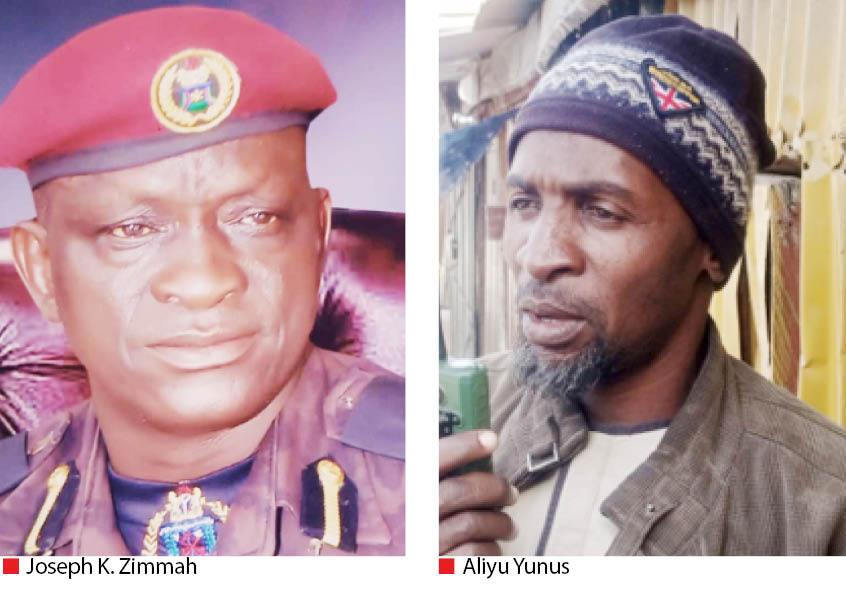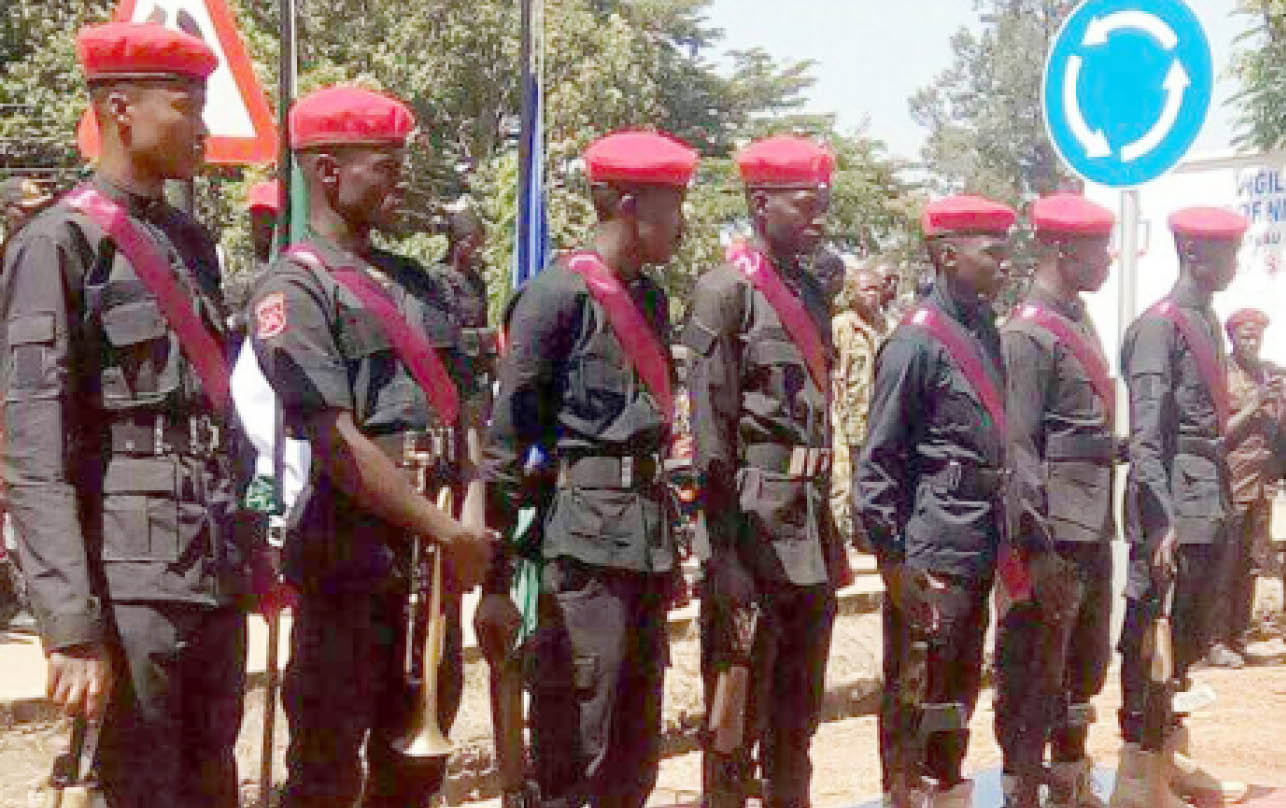Amidst the rising security challenges bedevilling many parts of the country, hundreds of local vigilantes have continued to pay the supreme price in their efforts to help protect their communities, Daily Trust Saturday reports.
Nigeria has, in recent times, been plagued by a surge in armed robbery, banditry, kidnapping, extrajudicial killings, attacks by unknown gunmen, ritual killings, and farmer-herder conflicts, among others.
While it is the duty of conventional security forces, such as the police, civil defence, the military and others to tackle security challenges and guarantee peace in the country, their shortcomings, due to many factors, have forced many communities to form local vigilantes and neighbourhood watch groups to fight insecurity.
- Hike in flour price: ‘Gurasa’ sellers down tools in Kano
- PDP govs donate N100m to victims of Plateau attacks
Investigation by Daily Trust Saturday showed that many vigilantes who volunteered to fight insecurity in their communities died as unsung heroes in the line of duty, while others sustained injuries without any form of compensation or support from the government in recognition of their selfless sacrifices.
It is in very few places that there is a semblance of recognition.
Lack of support bugs volunteers in Niger
In Niger State, despite the level of commitment and sacrifices with their lives and resources that have resulted in huge successes in the fight against banditry and insurgency in Shiroro, Rafi, Mariga, Munya, Lapai, Wushishi, Mashegu, Rijau, Paikoro and Kontagora local government areas, vigilantes said they did not get much from the government, especially at the state level, in terms of welfare and operational support.

The challenges they faced ranged from lack of acceptable weapons for their kind of services to confront their enemies, who bear sophisticated weapons, as well as lack of vehicles.
Most of them said they used their motorcycles for operation.
Although communities and local governments are said to have been supportive, wives of many of the vigilantes who lost their lives in the line of duty have been left to shoulder the responsibilities of their respective families without support from official quarters.
Daily Trust Saturday gathered that one of the vigilantes, Aliyu Danladi Allawa, was shot during attack by bandits on December 8, 2023. He is being treated at a health facility, while one of their motorcycles was also taken away by attackers.
During another attack, which took place recently, two villagers reportedly lost their lives.
Jibrin Allawa, the president, Lakpma Youth Assembly, Shiroro Local Government Area said, “Vigilantes always escort villagers to markets to buy foodstuff in Pandogari. Their major challenge is lack of operational vehicles. They only have motorcycles. And they don’t get welfare from the state government. But we in the community contribute money to support them. In the area of ammunition, the local government has been supportive.”
Sources said the existence of the vigilante corps in the state was backed by law, but their salaries and welfare are not well defined to strengthen their operation.
The deputy commander, vigilantes, Lapai Local Government Area, Ndatsu Yusuf said, “Our major challenge is lack of weapons and operational vehicles. And the government doesn’t show concern. It is the communities that support us. Some of our children are out of school because we don’t have time to engage in other things to get money. We have to compromise the welfare of our families for the protection of our communities.
“We have made significant successes in the fight against banditry in Lapai Local Government Area, but our efforts hardly get mentioned. Before soldiers were sent to join us, we were doing it alone. And even when soldiers came, we went to the bush with them. And sometimes, police do join us.”
He said they had lost some of their members whose families now live under the support of their communities, adding that the reward for their sacrifices would eventually come from God.
It’s selfless service in Jos
Vigilante groups in Jos, the Plateau State capital, have decried the harsh working condition under which they operate, saying it is more often “unbearable”.
The vigilantes, who operate under various platforms, said they were community and grassroots-oriented, and in the process of keeping the society safe, they make a lot of sacrifice.
Speaking with our correspondent, some of the vigilantes said that despite their lack of remuneration or any form of payment from any quarters, they still took a lot of risk.
They lamented that they spent their money/resources and time to secure the people, adding that they hardly spent good time with their families as they are always in the field to guarantee security for citizens.
They also said that despite the severe cold in Jos, they persevered and kept watch at night. And they often find it difficult to purchase firewood that would keep them warm or make tea/coffee to drink.
The commandant, Vigilante Group of Nigeria, Plateau State command, Joseph K. Zimmah, said their work included the fight against crime, security enlightenment campaigns, conflict resolution, among others.
He said they collaborated with the police and other security outfits at all times, adding that where it involves criminal cases (theft, violent attack/deadly fight) and attendant prosecution, they hand it over to the police, and if the case is drug-related, they hand over to the National Drug Law Enforcement Agency (NDLEA).
Zimmah said the challenges they faced in the course of their work were enormous since they are not being paid.
He said most of their members were menial workers/labourers and low-income earners, yet they tax themselves to raise funds to run their outfits.
The assistant commandant of Neighbourhood Watch in Gangare, a neighbourhood in Jos North, Bala Adamu, said they had been tackling incidents of theft, fighting and violence, among other societal menace.
He said that following the fallout of numerous Jos crises which divided the state according to ethno-religious habitation, such that Christians could not visit some Muslim communities and vice versa, but through their efforts over the years, they have been able to suppress the risk and change the narrative.
The assistant commandant said they worked hand-in-hand with the police.
“To meet up with our work, we are the ones who task ourselves for everything. We rent our offices, purchase our uniforms, shoes, torchlight, communication gadgets, sticks or whips, which we use to keep watch.

Similarly, the provost of Neighbourhood Watch, C Division in Jos, Aliyu Yunus, said they faced a lot of challenges, even from community members.
He said there were times when people committed criminal offences, only for their family members to come up with excuses in their defence.
The provost said that whenever such cases occurred, there won’t be moral support from other members or leaders of the community.
Yunus said that even their dane guns were just for symbolism because more often, there are no bullets because each bullet costs up to N3,000, which they cannot afford.
He said the police would ask them to assist in some issues; and they often synergised with other vigilante outfits like Hunters and the Vigilante Group of Nigeria (VGN), and this has yielded some results in the community.
‘We only have sticks as weapons’
In Kaduna, Muhammad Gwadabe Baba, the JTF commander in Kaduna South Local Government Area, said they joined the vigilante group to protect their communities from bad elements and contribute to securing the society.
According to him, the Divisional Police Officer in Kakuri is actively supporting their activities by deploying his men to join them in operations.
However, Gwadabe mentioned that a major challenge they faced was the presence of corrupt official security enforcers who often release suspects arrested by the JTF.
“Most of us have businesses, we use our resources to buy cars and fuel for operations. We also provide token allowances to our members without government’s support.
“Kurmin Mashi, Badiko, Tudun Wada, Barnawa, Television and Unguwar Mu’azu are under my control. We arrest criminals and hand them over to the police,” he said.
He added that their members often faced risks such as killing, injuries, intimidation and harassment from criminals who are later released, either by the court or other enforcement authorities.
Despite the challenges, the commander emphasised their determination to continue working to free their communities from criminal elements terrorising residents.
Similarly, the state public relations officer of the Coalition of Joint Taskforce in Kaduna State, Sunusi Surajo, said the lack of support from the state government and individuals often weakened their operation.
Kogi: Vigilantes poorly remunerated
In Kogi, Daily Trust Saturday gathered that the state had been using vigilantes, hunters, policemen and other security operatives in combating incidents of kidnapping, banditry and armed robbery.
The immediate past administration of Yahaya Bello established the state vigilante service to collaborate with police authorities for effective service delivery.
The state vigilantes are also entitled to allowance at the end of the month.
Also, in the spirit of community policing to stem criminal activities, particularly in Kogi East, the police authorities accredited and trained a vigilante group under the aegis of Kogi East Neighbourhood Watch (KENW). Some of the members at the critical flash points were sometimes paid stipends.
The state police command’s public relations officer, SP William Aya, had on many occasions applauded the services of vigilantes and hunters in assisting the operatives in their battle against hoodlums.
“Many members of these vigilante groups are poorly paid; in most cases, many do not receive allowance for their efforts. Some receive between N5,000 and N10,000 monthly.
“Some were known to have died in the process of assisting to guard their communities.
“A few months ago, a vigilante, Mustapha Abu, was shot and killed at Chairman’s Quarters in Ankpa town in the state. One other died while on the trail of suspected kidnappers on the Ochadamu-Itobe road,” a Lokoja-based activist, Comrade Abu John said.
Adebayo Segun, a hunter in Kabba community also said, “We remain the best as regards intelligence gathering at the grassroots that will keep criminals on the run, but the society is not encouraging us.”
‘Yobe, Borno govts supportive’
However, Daily Trust Saturday learnt that Yobe and Borno governments have been supportive of vigilantes in their states.
The leader of the Yobe Vigilante Group, Idrisa Buba, said the state government was supporting the families of their colleagues who paid the supreme price with food and non-food items.
Our correspondent learnt that at the height of Boko Haram crisis, the support conventional security operatives got from vigilantes was monumental.
“Whenever the State Emergency Management Agency (SEMA) is distributing food items, we would collect for families of the deceased. The North East Development Commission (NEDC) is giving them support.
“Also, we sometimes go through the special adviser to Governor Buni on security to request for assistance when daughters of our deceased colleagues are getting married; we do get help,” Idrisa Buba said.
When contacted, Aisha, a widow, whose vigilante husband was killed by Boko Haram in Buni Yadi, said she received food items from the state government, but appealed that her children be enrolled in school.
“One thing disturbing me is the children’s school, but the government is trying for us,” she said.
Zulum offers scholarship to 500 slain CJTF children
In Borno, Governor Babagana Umara Zulum has awarded scholarship to 500 children of the Civilian Joint Task Force (CJTF) members who died while fighting Boko Haram.
Zulum, who announced the intervention while presenting the state’s budget at the House of Assembly, said many fighters, hunters and vigilante groups of the CJTF died while fighting to restore security in the state, so their children will be honoured as “Borno heroes.”
The governor also promised to continue supporting the widows with food and other means of livelihood.
“We plan to launch the Borno Heroes Support Programme. This programme involves the setting up of a government team that will identify primary and secondary school-aged orphans of volunteers in the CJTF, hunters and volunteers who died during battles.
“The government will give these orphans scholarship to federal government colleges and international schools. The programme is to be in phases with a pilot phase of 500 orphans.
“Many of these Civilian JTF fighters, hunters and vigilantes have lost their lives fighting for Borno’s peace, Insha’Allah, we plan to reward their priceless sacrifices by educating the children they left behind, and by supporting their widows through a programme we plan to launch in January”, he said.
When contacted, a Civilian JTF member from Monguno, who gave his name as Ba’ana, said the governor was doing his best for the fallen heroes but they still had some challenges.
Abubakar Akote (Minna), Dickson S. Adama (Jos), Mohammed Ibrahim Yaba (Kaduna), Tijani Labaran (Lokoja) & Hamisu Kabir Matazu (Maiduguri)

 Join Daily Trust WhatsApp Community For Quick Access To News and Happenings Around You.
Join Daily Trust WhatsApp Community For Quick Access To News and Happenings Around You.

